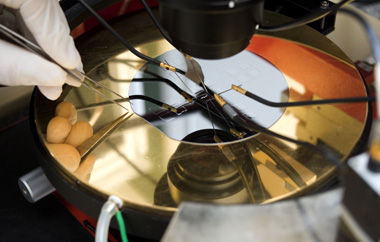Today, the Rheinisch-Westfälische Technische Hochschule (RWTH) Aachen is the largest technical university in Germany, with more than 45,000 students enrolled in 157 courses. It maintains close links to industry and accounts for the highest amount of third-party funds of all German universities in both absolute and relative terms per faculty member. In 2007, RWTH Aachen was selected by the German Research Foundation (DFG) as one of nine German Universities of Excellence. The RWTH takes pride in maintaining an open communication culture and in enjoying full support from all university groups, especially its students, for its vision and strategic goals.
Research topics at RWTH Aachen include sustainable synthetic fuels, data mining, computational science, production technology, high-performance materials, health, renewable resources and mobility. The academic expertise found at RWTH Aachen led to the establishment of the Forschungszentrum Jülich and numerous other research centres in and around Aachen, turning the area into a “Silicon Valley” at the heart of Europe.
More than 9,500 international students from over 135 countries give the scientific centre of Aachen international flair. The students and their diverse cultural life create a vibrant and lively atmosphere in this historic city, particularly in the student quarter Pontviertel. The proximity of Aachen to the Eifel and the Ardennes, to Maastricht and Brussels with their linguistic and cultural distinctiveness lends some particular charm to the city, and tourists from around the world flock to Charlemagne’s resting place in Aachen Cathedral, one of the first UNESCO world heritage sites.
Institute of Sustainability in Civil Engineering (INaB)
In its activities, the Institute of Sustainability in Civil Engineering (in German: Institut für Nachhaltigkeit im Bauwesen - INaB), established in June 2017 at the Faculty of Civil Engineering of RWTH Aachen University, is working on and researching challenges and opportunities to reach a sustainable development by decoupling the economic development with the increment of resource use.
Through its work in the field of sustainability assessment and research, INaB contributes to achieving the social transformation necessary for a harmonious co-existence of future societies and ecosystems. It researches methods and develops tools and case studies for assessing, measuring and improving the sustainability performance of products, services and infrastructures in sectors such as building, automotive, raw materials, food and fashion.
Since June 2017, Prof Marzia Traverso has been chairing the Institute. Current projects focus on developing and implementing environmental certification processes (e.g. Environmental Product Declaration) of various building materials, revising the guidelines for social life-cycle assessment (project sponsored by the UN Environment Life Cycle Initiative) and the EU Ecolabel criteria for converted paper products (funded by Joint Research Centre Seville, European Commission).
Institute of Mineral Resources Engineering (MRE)
RWTH Aachen already looked back on more than 100 years of mining education and mineral resources research when the newly formed Institute of Mineral Resources Engineering (MRE) opened its doors to students in 2015. Today’s research focus of its junior and senior scientists lies on the development of sustainable mining techniques, simulation and modeling of mining processes, deposit characterization, mineral economics, environmental issues and health & safety.
Population increase and growing affluence on a global scale entails a rising demand for mineral raw materials. This poses a challenge to education and science institutions to research and develop both environmentally sound and economical methods of raw material extraction. Finding sustainable solutions to pressing problems in the fields of Mining Engineering and Mineral Resource Science is the main objective of MRE.
A diverse team of scientists with backgrounds in raw material extraction, geology, business management, environmental chemistry and physics is working at MRE. Current research projects comprise both national and international initiatives as well as industry-funded collaborations and services.






